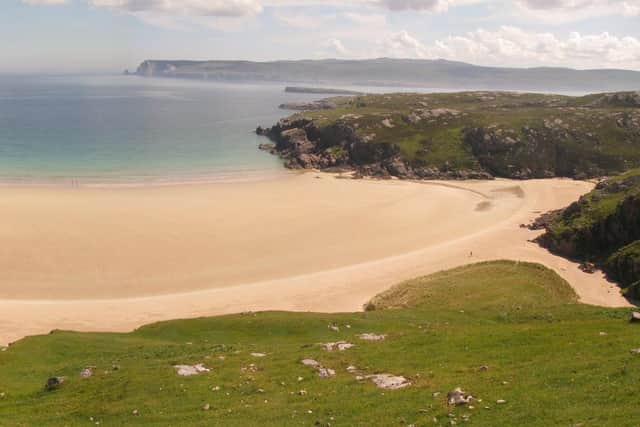Camping in Scotland: 'Some parts of the Highlands just can't take it anymore'
Rangers have closed off dunes and machair at Traigh beach at Arisaig in Lochaber and Ceannabeinne at Durness in Sutherland, which sits on the NC500 driving route, given the impact of visitors to the fragile natural environment.
Access to the sands is still open, but fencing has now been placed over the dunes to deter campers.
Advertisement
Hide AdAdvertisement
Hide AdThe Highland Council Ranger Service, in a social media post, asked if there was now “too much camping?” and urged campers to stay away from both beaches.
The statement said: “Some parts of the Highlands just can’t take it anymore. Even responsible camping in the same place week after week can cause damage to nature.”
Rangers have consulted with NatureScot and the land manager to make local adjustments to the Scottish Outdoor Access Code in light of the issues at both beaches.


Temporary fencing has now been placed at the two sites to allow the vegetation to recover.
The statement added: “We are asking that people respect these areas and camp elsewhere. Please help us protect these fantastic places so we can enjoy them for years to come.”
The restricted access comes amid growing upset in some communities, particularly those around the NC500, about the impact of high numbers of campers, tents and motorhomes, with Right to Roam legislation being used as a justification by some visitors for being able to camp with impunity.
The Scottish Outdoor Access Code (SOAC) states access rights applies to wild camping, but that it should be done in small numbers for only two or three nights in one place and should be done with consideration for local people away from fields, buildings, roads and historic structures and with all litter, traces of pitch and any fire removed.
Access rights do not apply to vehicles, but the SOAC states motorists must not cause damage or obstruction, such as making it difficult for others to use a road or blocking an entrance to a field or building.
Advertisement
Hide AdAdvertisement
Hide AdStuart Griffin, of the Roads to the Isles Facilities Group, has campaigned for better visitor management and improved infrastructure in tourist hot-spots in the Arisaig area.
He said campers on Traigh beach had been down this summer compared to previous years given the poorer weather, but added the sunshine of last weekend had drawn people to the area once again.
Mr Griffin said: “Overall I think the impact on the beach has been reduced this year. The local view is that we would like no camping on the beaches, but we have to be realistic.
"Managing the parking at Traigh by putting in posts and banks has made an impact and Highland Council putting a traffic officer here has had an influence on dangerous and dodgy parking.
"A lot of people like to roll out of their car and into their tent and if they have to make a bit more of an effort, well it has been useful. Highland Council have also hired rangers and that has helped things. It gives an impression the area is being looked after. The rangers are out there, pro-actively speaking to people to help improve behaviour.”
Comments
Want to join the conversation? Please or to comment on this article.
